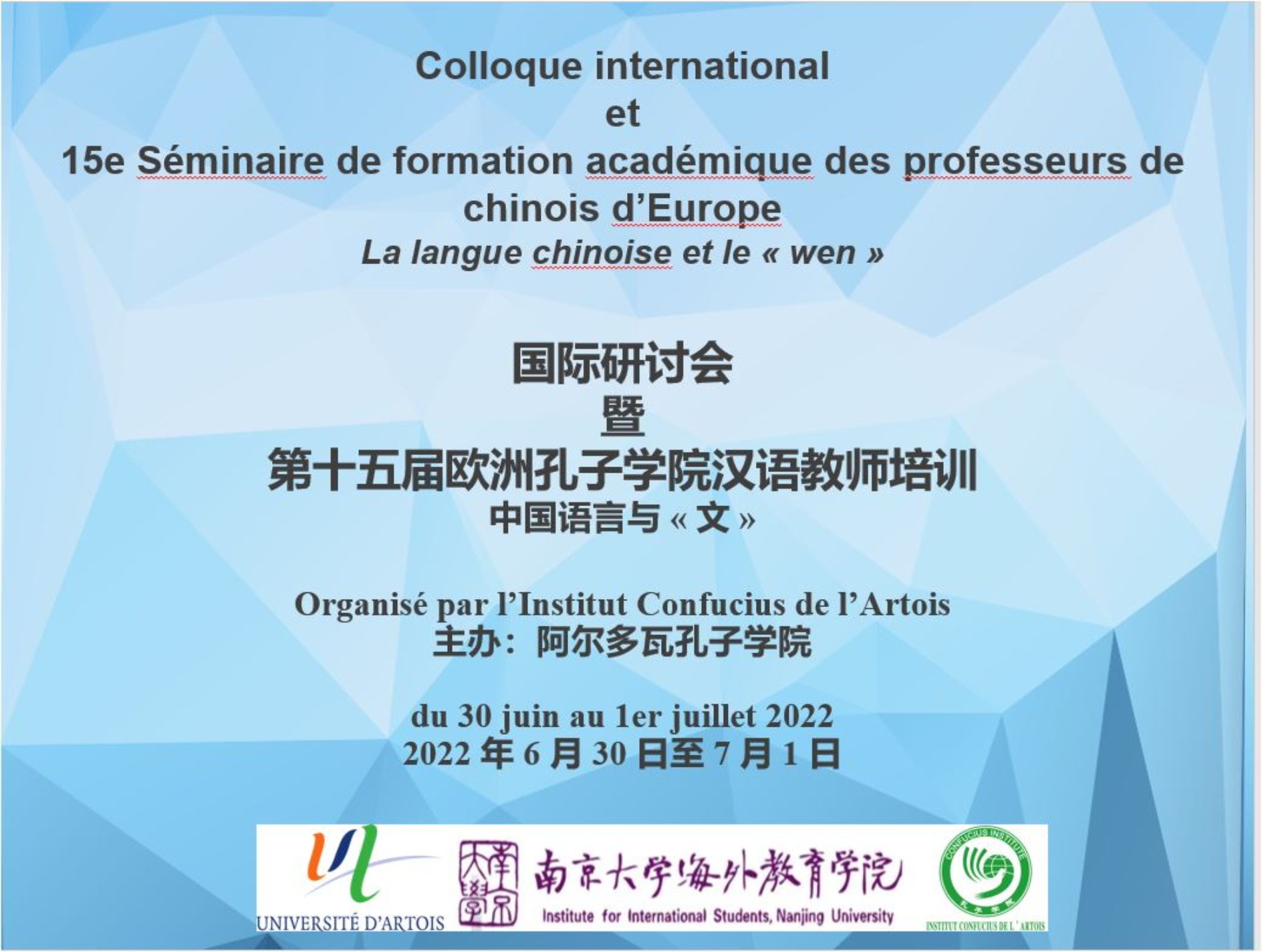
2022年6月30日至7月1日,法国阿尔多瓦孔子学院成功举办中国语言与“文”的国际研讨会暨第十五届欧洲孔子学院汉语教师与本土教师培训,来自19个国家, 20所孔院,63家单位,共计91人参加。
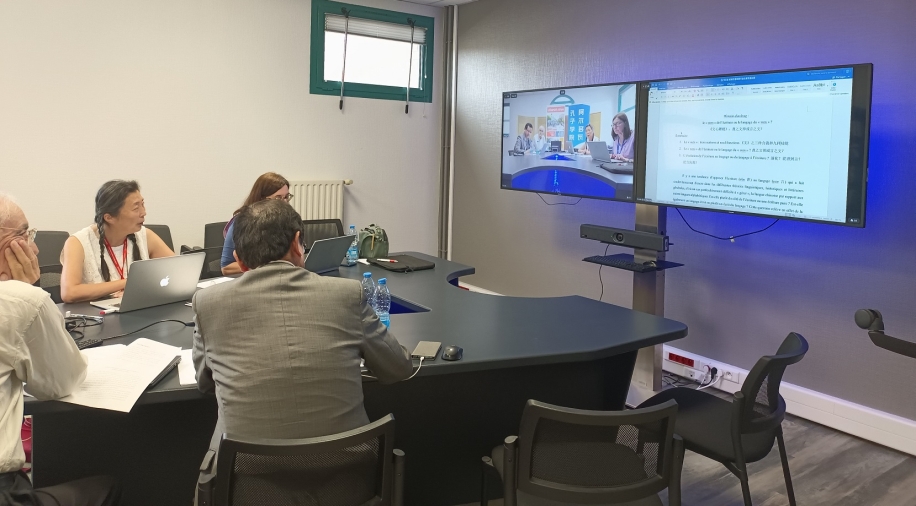
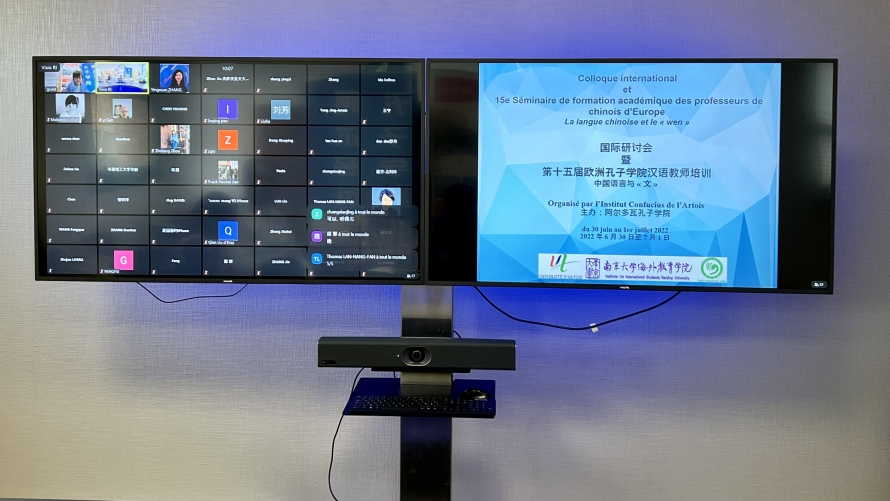
中国语言与“文”国际研讨会暨第十五届欧洲孔子学院汉语教师与本土教师培训会场与线上会议
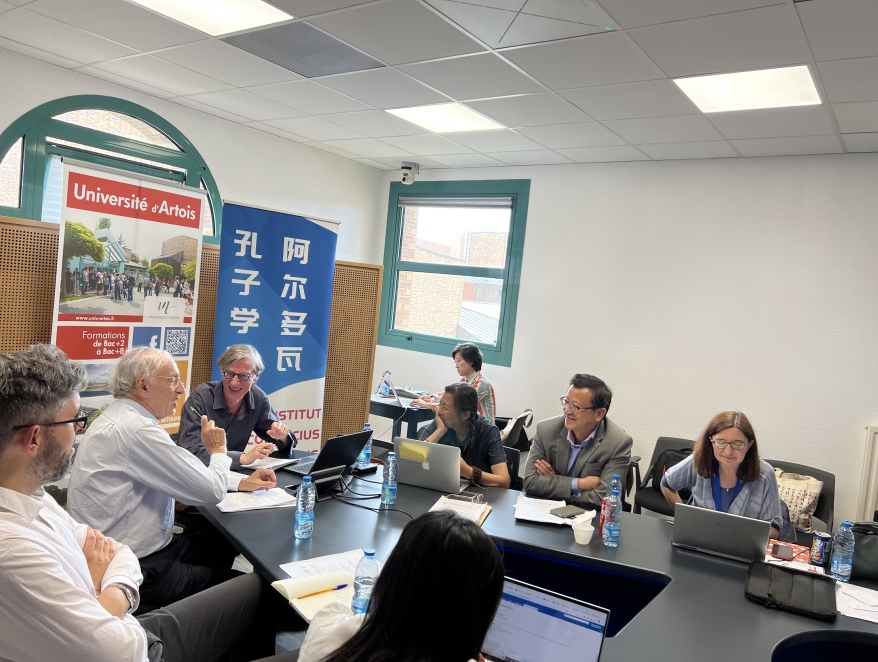
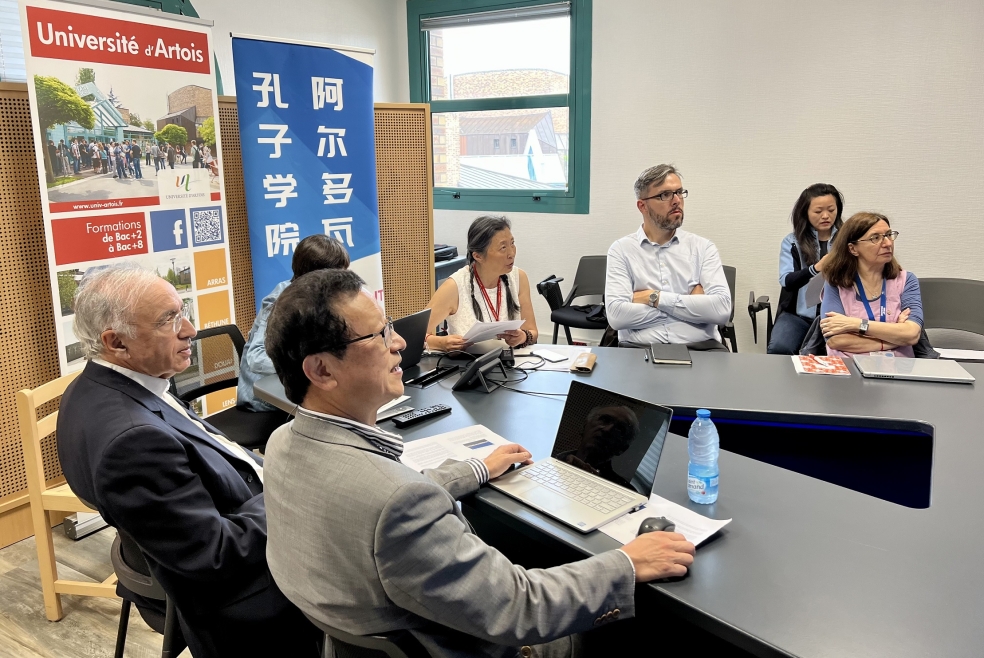
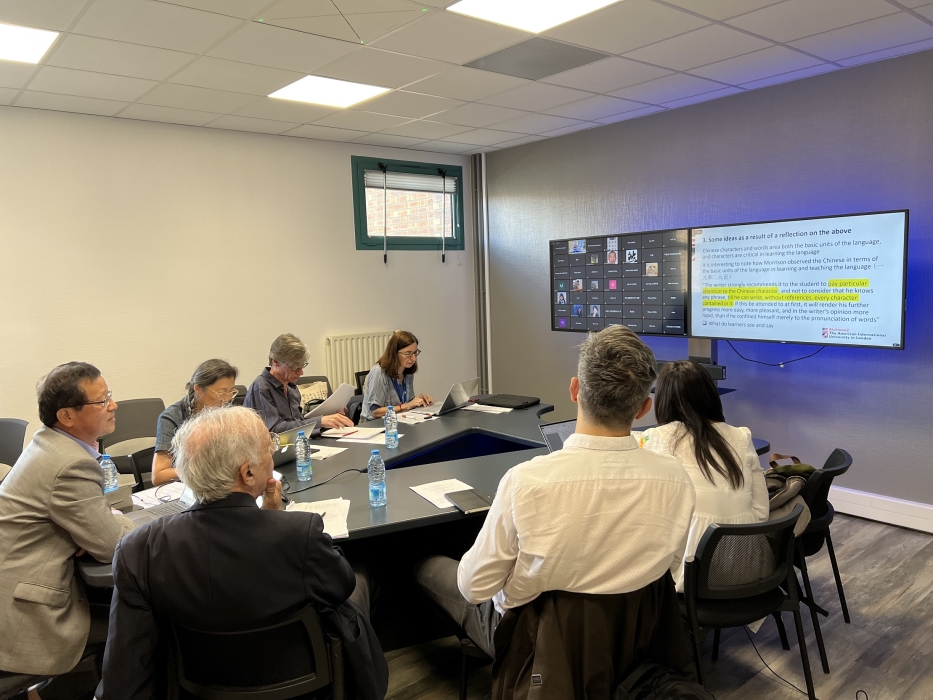
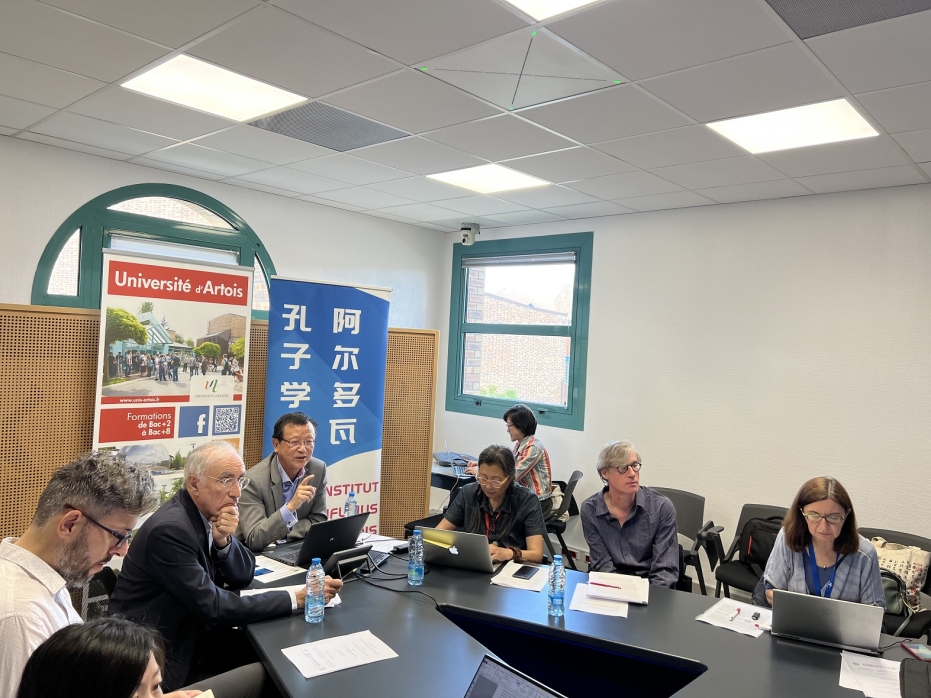
中国语言与“文”国际研讨会暨第十五届欧洲孔子学院汉语教师与本土教师培训主会场
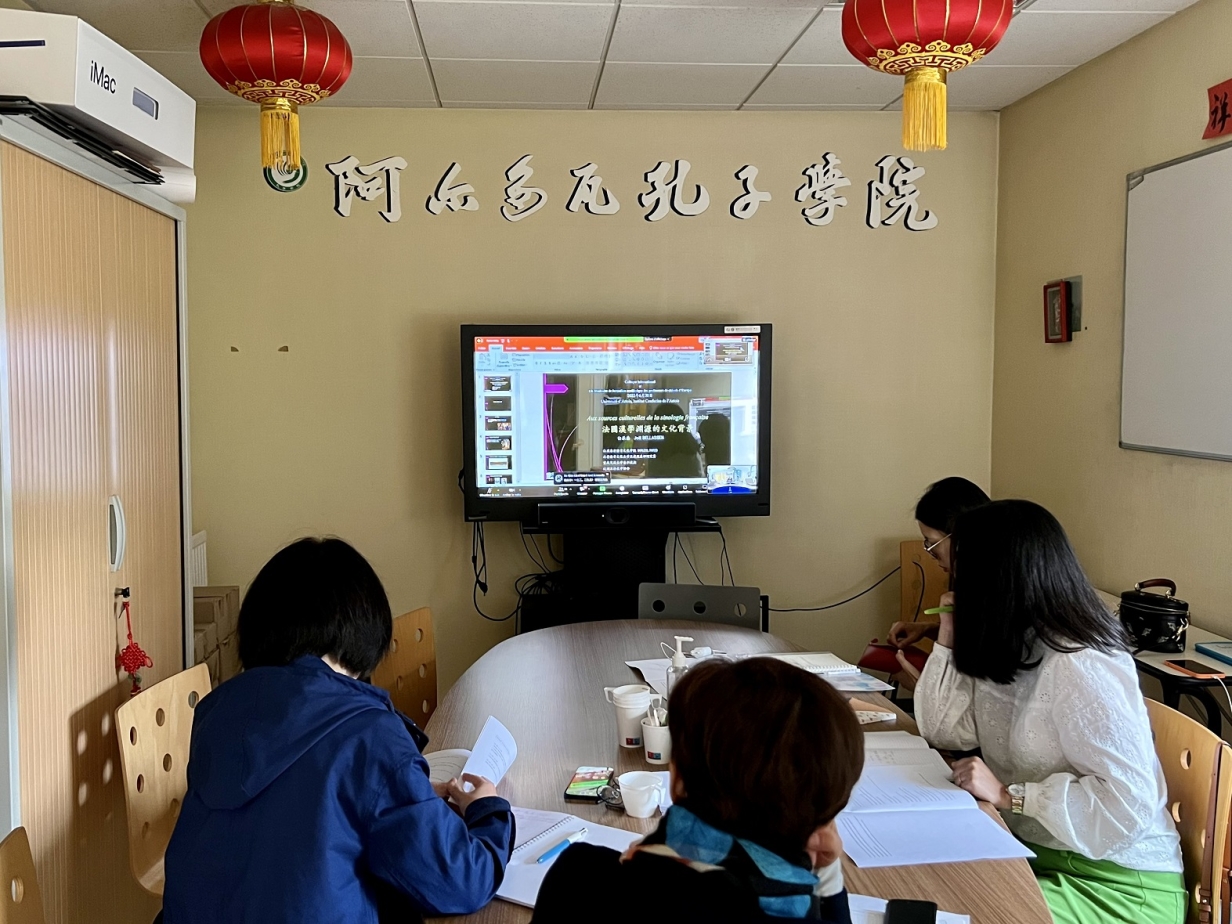
中国语言与“文”国际研讨会暨第十五届欧洲孔子学院汉语教师与本土教师培训分会场
本次研讨会与培训由阿尔多瓦大学、南京大学海外教育学院与法国阿尔多瓦孔子学院合办,主题为《中国语言与“文”》。第一天的会议由阿尔多瓦孔子学院院长金丝燕教授主持。北京师范大学王宁教授首先从汉字科学出发,带领老师们了解汉字的构字原理和区别特征,并提出使用拼音文字的学习者需要解决的问题,最后给出对外汉语教学指导意见。法国东方语言文化学院(Institut national des langues et civilisations orientales)白乐桑(Joël Bellassen)教授由17世纪路易十四派出的“国王数学家”开始,一直为我们介绍到现当代法国汉学家戴密微(Paul Demiéville)、汪德迈(Léon Vandermeersch)等重要人物以及相关书籍、事件与机构,描绘了更广泛意义的汉学在法国的发展过程。北京师范大学李国英教授以“六书”理论为缘起,倡导用全球视野来研究汉字型文字。李教授总结出九种汉字构形原则,突出展示汉字是据意构形的表意文字,并强调汉字形义关系的重要性。北京师范大学董晓萍教授从中国文学、民间文学和海外汉学切入,跨文化、跨学科地展示关于“文”的现象和本质,认为中国文学、民间文学是通过汉语汉字成为海外汉学的现代热点。接着,老师们一起观看汪德迈生前关于占卜起源的中国文化与源于神学和圣经的西洋文化比较的珍贵讲座。最后,金丝燕教授从“文”的三种含义和九种功能出发,强调“书”与“言”的并列关系,其中的关键因素是“文”。
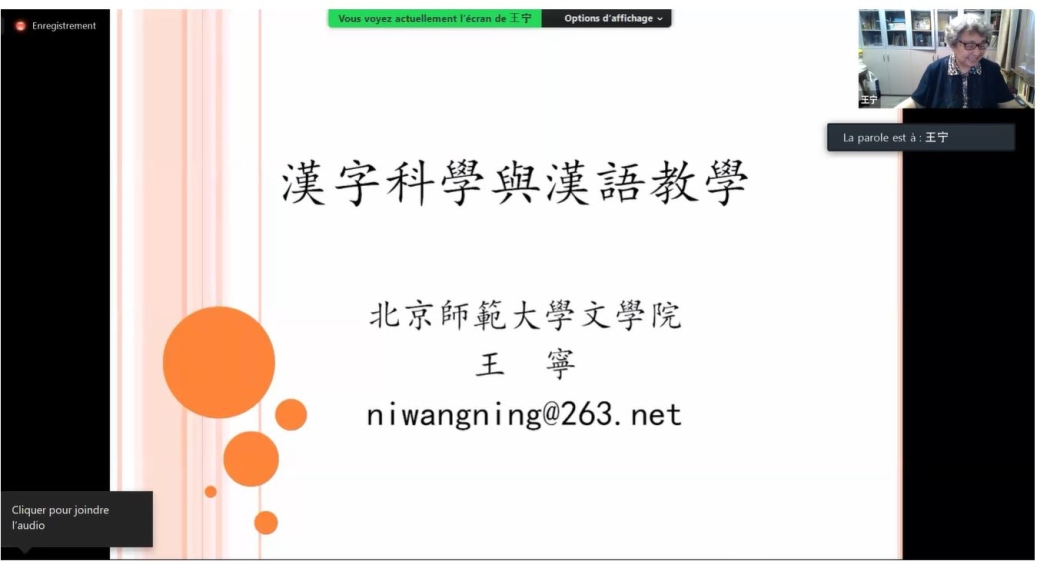
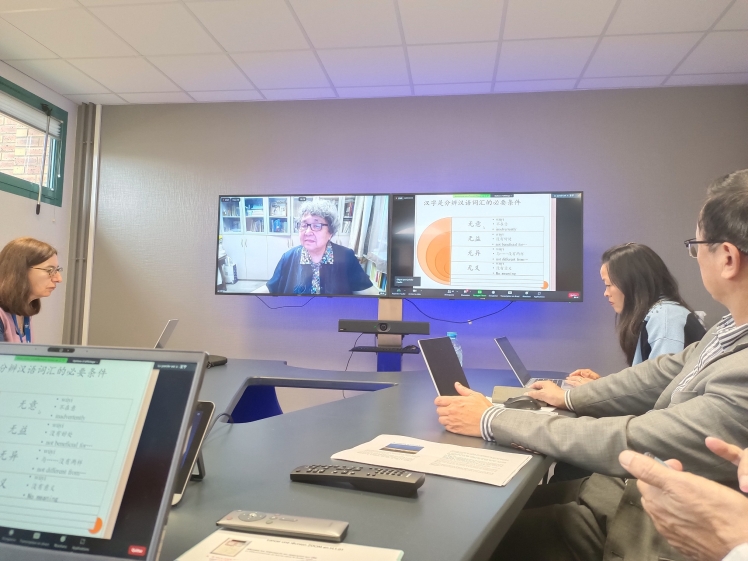
北京师范大学王宁教授《汉字科学与汉语教学》
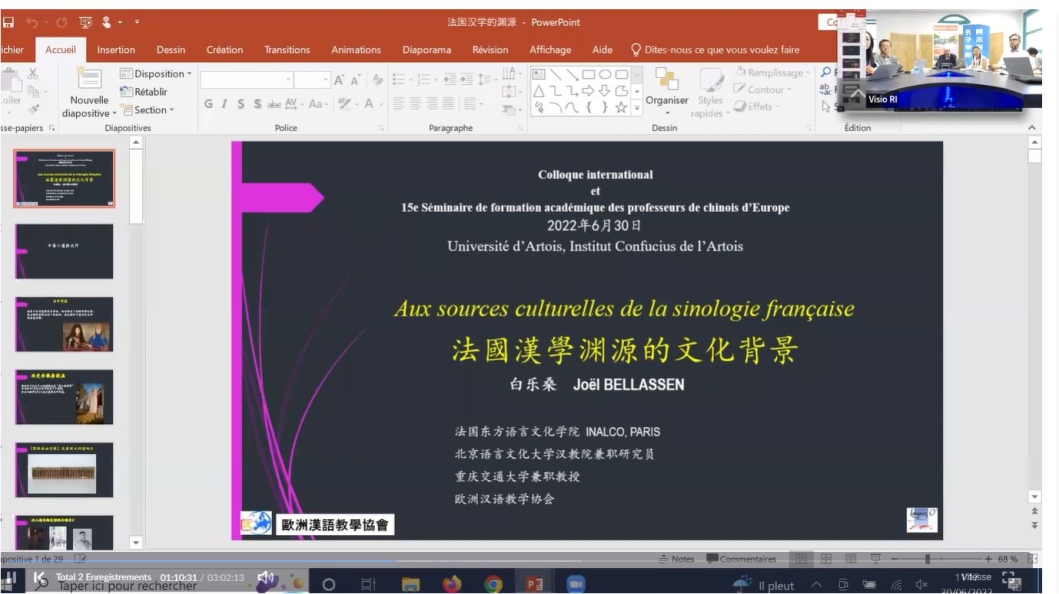
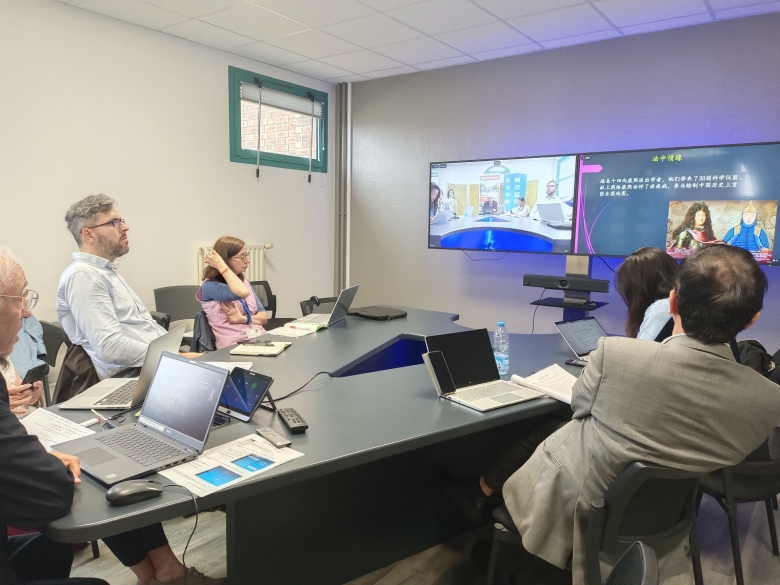
法国东方语言文化学院白乐桑(Joël Bellassen)教授《法国汉学渊源的文化背景》
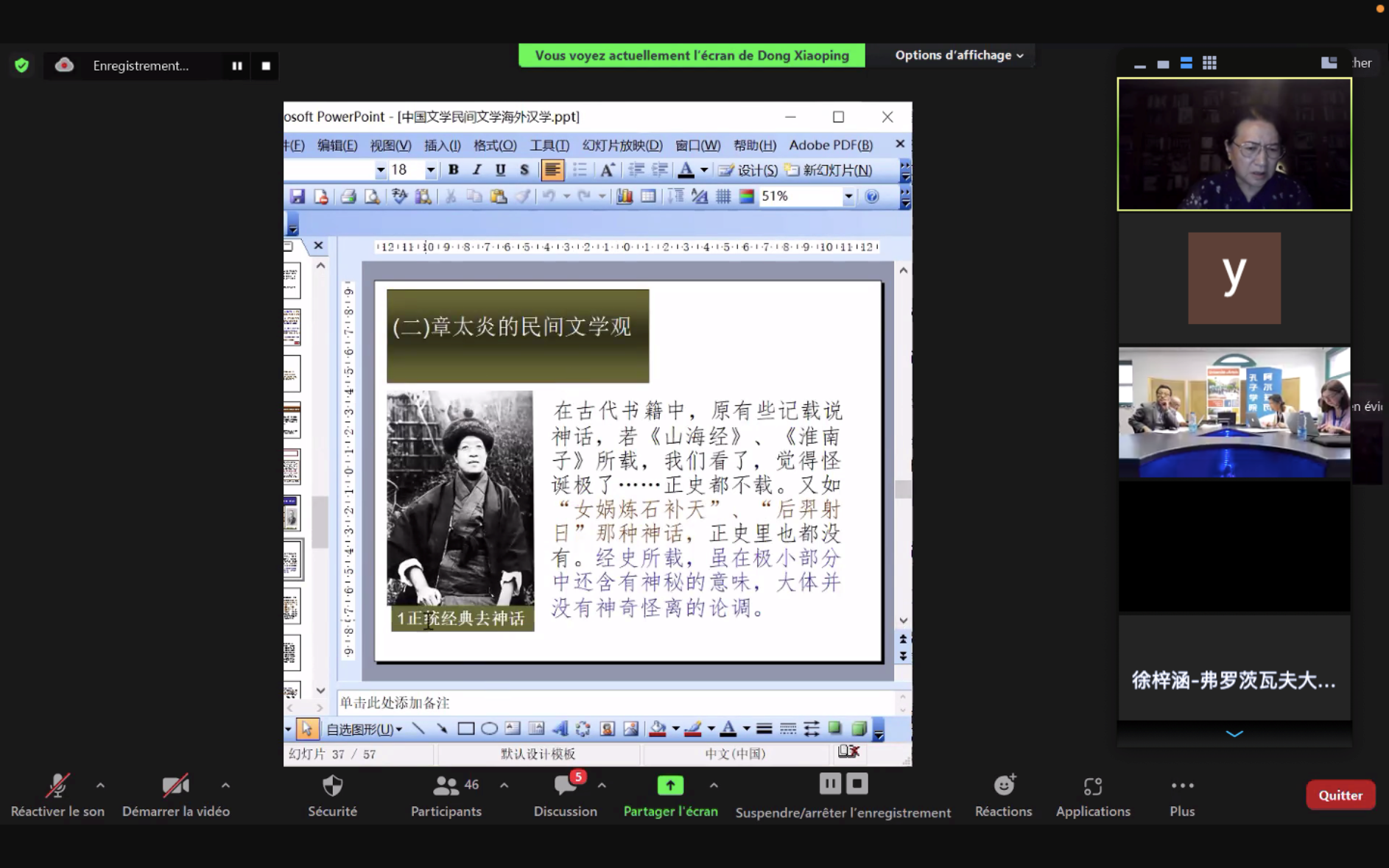
北京师范大学董晓萍教授发言
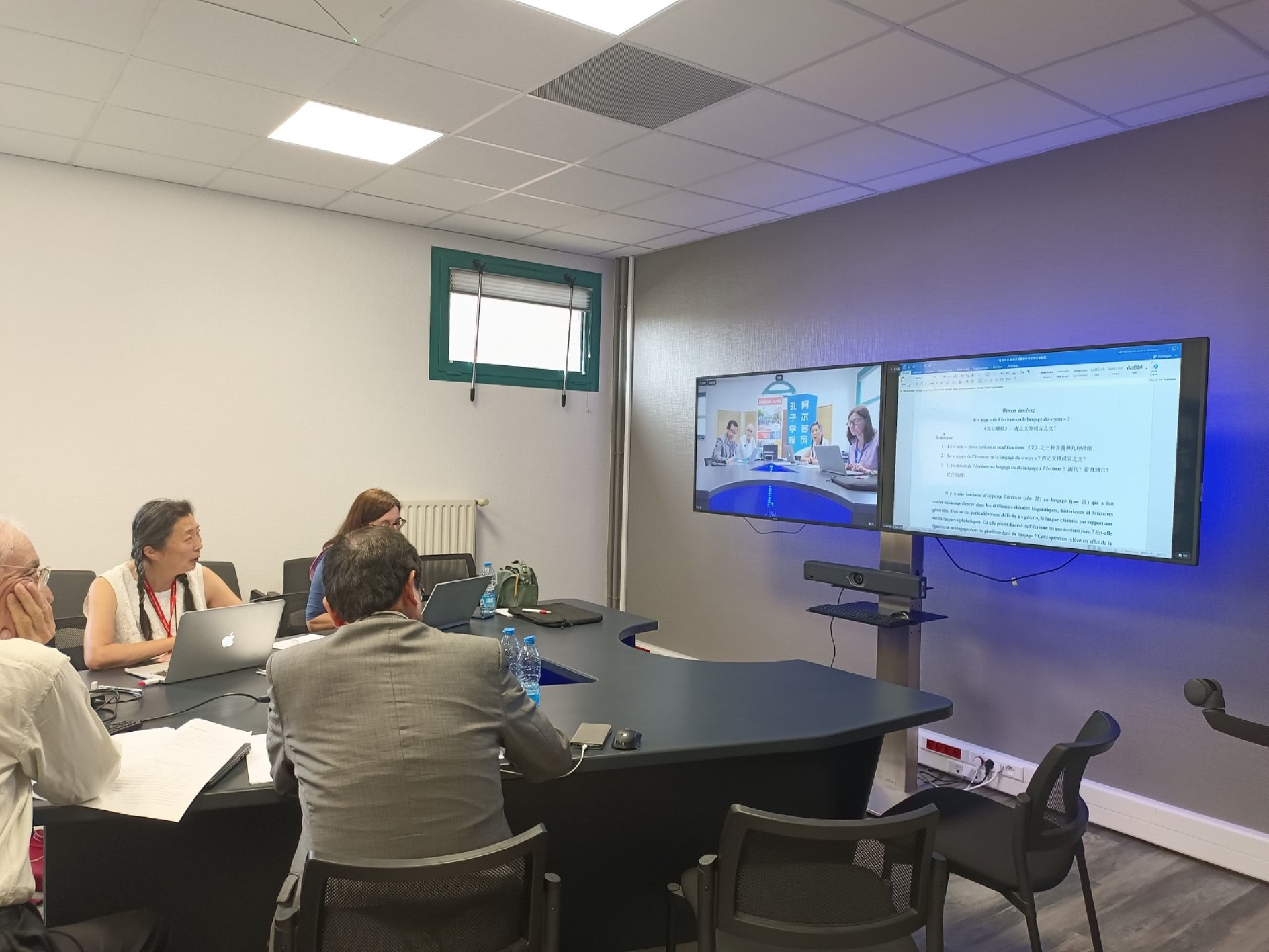
法国阿尔多瓦大学金丝燕教授发言
第二天的会议由白乐桑教授主持。伦敦里士满美国国际大学(Richmond, The American International University in London)张新生教授把历史框架和个案研究相结合,把宏观和微观相结合,梳理了英国汉学发展历程,同时突出了以文本研究为基础的英国汉学传统和对汉字的高度关注。法国阿尔多瓦孔子学院路易萨(Luisa Prudentino)教授主要介绍了一些被遗忘的早期意大利传教士先锋人物,通过展示他们的主要贡献勾勒出意大利汉学的先锋性和前沿性。最后,比利时根特大学(Ghent University)巴得胜(Bart Dessein)教授以历史上与中国相关的重大外交事件和与中国语言文化相遇的重大事件为主线,展示了比利时汉学的发展,介绍了对比利时汉学做出突出贡献的人物与目前建立汉学系的大学。
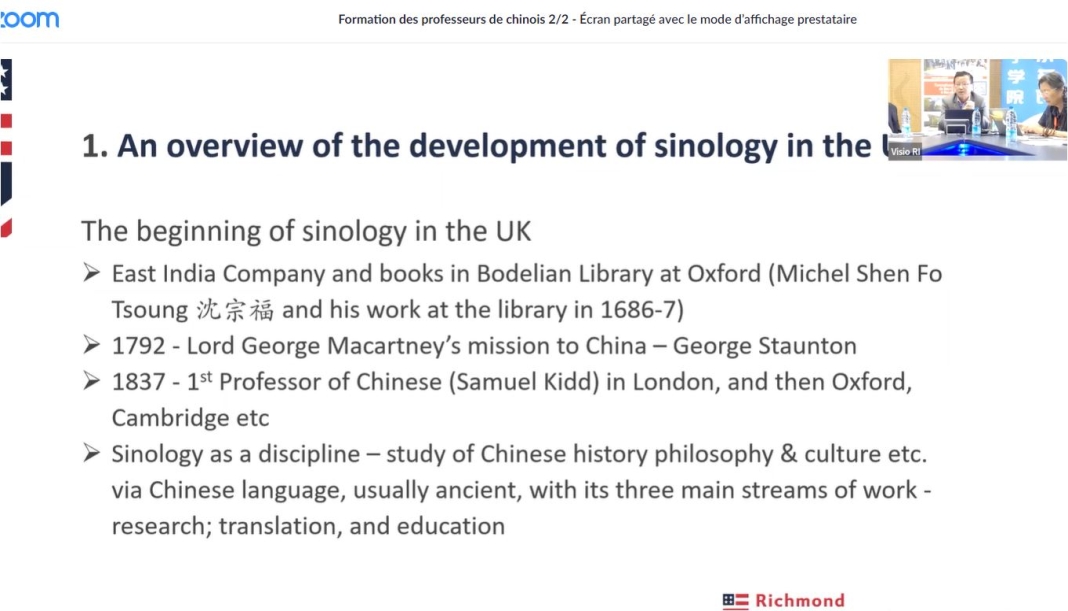
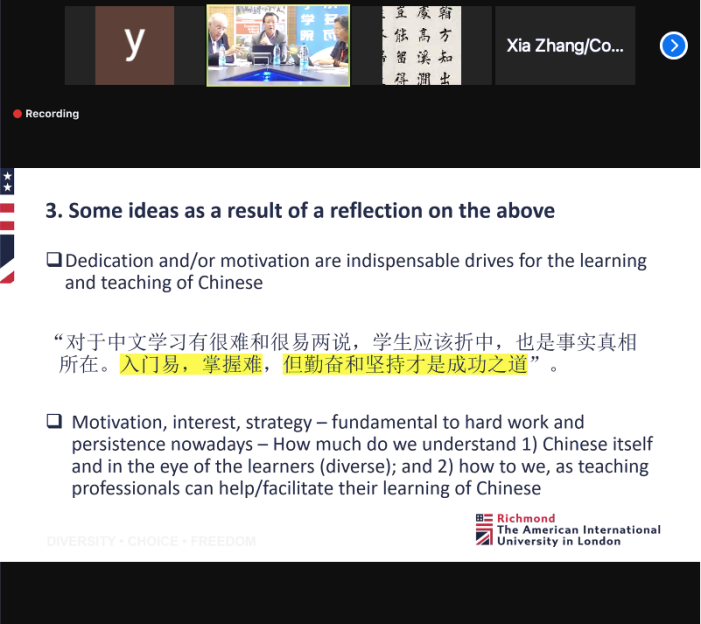
伦敦里士满美国国际大学张新生教授发言
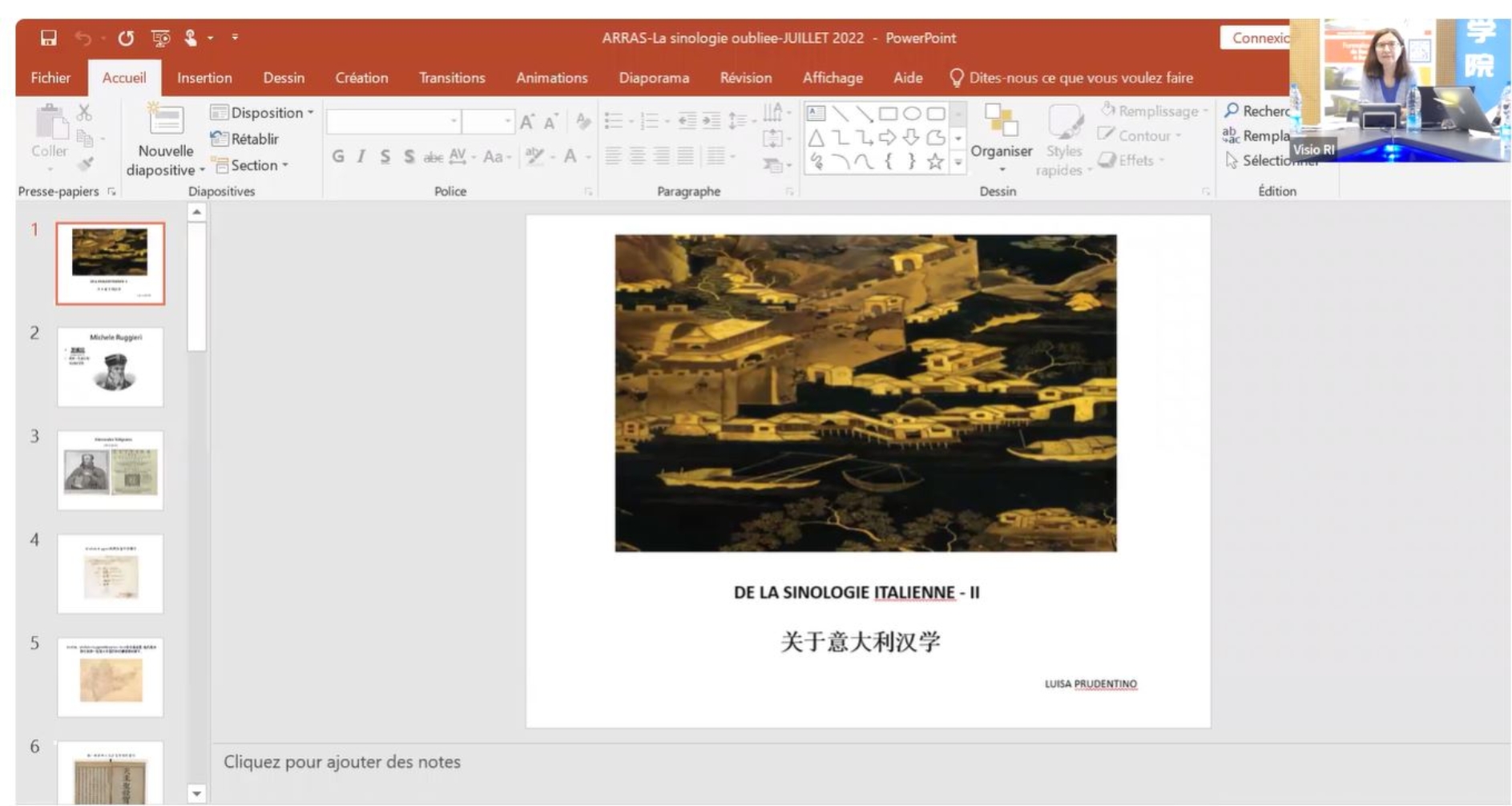
法国阿尔多瓦孔子学院路易萨(Luisa Prudentino)教授发言
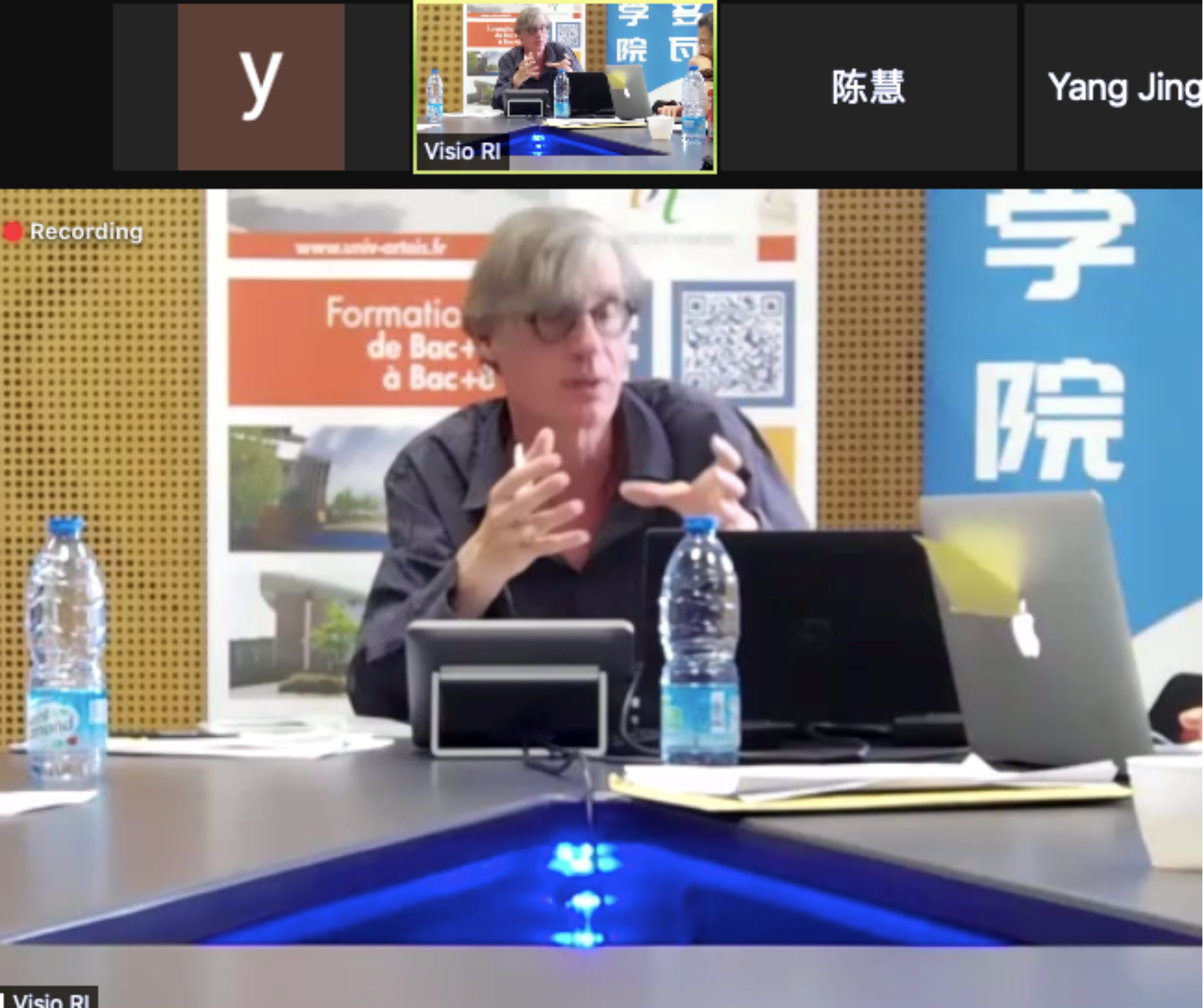
比利时根特大学巴得胜(Bart Dessein)教授发言
会议结束之际,金丝燕教授总结陈词并展望未来。孔院将继续拼写欧洲汉学历史,提出欧洲汉语教师可能面临的问题和研究探讨的主题,继续坚持将教师培训与高端研究相结合,努力为欧洲汉语教师提供更宽阔的视野和研究论题的平台。本次培训受到线上和线下参会老师的一致好评。
供稿/陈云云
供图/法国阿尔多瓦孔院
15th International Training Seminar for Chinese Language Teachers from Confucius Institutes in Europe
From 30 June to 1 July 2022, at the University of Artois, the 15th International Seminar dedicated, as in previous years, to the training of Chinese language teachers from European Confucius Institutes was successfully held. 91 people from 19 different countries as well as 63 organisations between schools, institutes (of which 20 ICs) and companies participated.
The seminar and training was co-organised by the University of Artois, the Institute of International Studies of Nanjing University and the Artois Confucius Institute. This year's theme was "The Chinese Language and Wen".
The session on the first day of the Colloquium was chaired by Professor Jin Siyan, Director of the Artois Confucius Institute. She introduced Professor Wang Ning, from Beijing Normal University, who started the session with an in-depth examination of Chinese characters, guiding teachers through the principles of character construction to highlight their distinctive features, and also presenting issues that should be addressed by learners when using pinyin. Finally, she gave advice on teaching Chinese as a foreign language.
Professor Joël Bellassen, from INALCO (Institut National des Langues et Civilisations Orientales), spoke about the origins of French sinology, also mentioning great modern and contemporary sinologists such as Paul Demiéville and Léon Vandermeersch, and the great contribution they have made to the development of sinology in France.
Professor Li Guoying, from Peking Normal University, placed the study of Chinese characters in a global perspective based on the theory of the "six methods of Chinese character formation". Mr Li explained nine principles of Chinese character formation, emphasising the fact that Chinese characters are ideographic characters configured according to their meaning and the importance of the relationship between Chinese characters and their meaning.
In the afternoon, Professor Dong Xiaoping from Peking Normal University, using Chinese literature, including popular literature, and various sinological works as a starting point, showed the importance and significance of "wen" from an intercultural and interdisciplinary point of view.
Afterwards, the teachers watched a lecture that the French sinologist Léon Vandermeersch had given in the past on a comparison between Chinese culture, which comes from divination, and Western culture, which comes from theology and the Bible.
The first day of the colloquium ended with a presentation by Ms Jin Siyan on the three meanings and nine functions of 'Wen'. She focused especially on the juxtaposition between 'writing' and 'speaking', whose key factor is precisely 'Wen'.
Professor Joel Bellassen chaired the second day of the training seminar. He introduced Professor Zhang Xinsheng, from the American International University in London(Richmond). Dr Zhang combined the historical framework with case studies, from the macroscopic to the microcosmic, to illustrate the development of Sinology in the UK. He highlighted the tradition of British Sinology which is mainly based on textual studies with emphasis on Chinese characters.
Professor Luisa Prudentino, from the University of Artois, presented some pioneer figures, long forgotten, of Italian sinologist missionaries in the vast panorama of exchanges between Italy and China. She highlighted in particular the avant-garde aspect of Italian sinology and the main contributions of these pioneers.
Finally, Professor Bart Dessein, from the University of Ghent, starting from the main diplomatic events related to China throughout its history, showed the development of Belgian sinology thanks to the exceptional contributions of some sinologists, and also presented the Belgian universities that currently have sinology departments.
Professor Jin Siyan gave the closing speech, emphasising the role that the Confucius Institute will continue to play in the history of European Sinology, proposing solutions to the problems that teachers of Chinese language in Europe may face, and striving to combine the discussion topics with high-level research in order to provide these teachers with a broader perspective and a real platform for their research topics.
The teachers who attended the face-to-face course and also those who attended the online course highly appreciated the quality of the presentations.
Edition / Luisa PrudentinoCHEN Yunyun
Photo/ Confucius Institute of Artois
15e Séminaire International de formation des professeurs de langue chinoisedes Instituts Confucius d’Europe
Du 30 juin au 1er juillet 2022, à l’Université d’Artois, s’est tenu avec succès le 15éme séminaire internationalconsacré, comme les années précédentes, à la formation des enseignants de langue chinoisedes Instituts Confucius européens ; 91 personnes de 19 pays différents ainsi que 63 organismes entre écoles, instituts (dont 20 IC) et entreprises y ont participé.
Le séminaire et la formation ont été co-organisés par l'Université d'Artois, l'Institut des études internationales de l'Université de Nankin et l’Institut Confucius de l’Artois. Le thème de cette année fut « La langue chinoise et le wen ».
La session du premier jour du Colloque a été présidée par le professeur Jin Siyan, directeur de l'Institut Confucius de l’Artois. Elle a introduit le professeur Wang Ning, de l'Université Normale de Pékin,qui a commencé la session en partant d’une examination approfondie des caractères chinois, en guidant les enseignants à travers les principes de la construction même des caractères afin d’en souligner ainsi leurs caractéristiques distinctives, et en présentant également les questions qui doivent être abordées par les apprenants au moment d’utiliser le pinyin. Enfin, elle a donné des conseils sur l'enseignement du chinois en tant que langue étrangère.
Le professeur Joël Bellassen, de l’INALCO (Institut National des Langues et Civilisations Orientales), a communiqué sur les origines de la sinologie française, en évoquant également de grands sinologues modernes et contemporains tels que Paul DemiévilleetLéon Vandermeersch, et de la grande contribution qu’ils ont apportée au développement de la sinologie en France.
Le professeur Li Guoying, de l'Université Normale de Pékin, a placé l'étude des caractères chinois dans une perspective globale basée sur la théorie des « six méthodes de formation des caractères chinois ». En effet, M. Li a exposé neuf principes de formation des caractères chinois, en soulignant le fait que ces derniers sont des caractères idéographiques configurés selon leur signification ainsi que l'importance justement de la relation que les caractères chinois entretiennent avec leur signification.
Dans l'après-midi, le professeur Dong Xiaoping, de l'Université normale de Pékin,en partant de la littérature chinoise, y comprise la littérature populaire, et de différents ouvrages sinologiques, a montré l'importance et la signification du « wen » d'un point de vue interculturel et interdisciplinaire.
Ensuite, les enseignants ont regardé une conférence que le sinologue français Léon Vandermeerschavait donnée dans le passé sur une comparaison entre la culture chinoise, issue de la divination, et la culture occidentale, issue de la théologie et de la Bible.
La première journée du colloque s’est terminée avec l’intervention de Mme Jin Siyan sur les trois sens et les neuf fonctions du « Wen ». Elle a mis surtout l’accent sur la juxtaposition entre l’« écrit » et la « parole », dont le facteur clé est justement le « Wen ».
Le professeur Joёl Bellassen a présidé le deuxième jour duséminaire de formation.Il a introduit le professeur Zhang Xinsheng,de l'American International University de Londres(Richmond). M. Zhang a combiné le cadre historique avec des études de cas, du macroscopique au microcosmique, pour illustrer le développement de la sinologie au Royaume-Uni. Il a mis en évidence la tradition de la sinologie britannique qui se base surtout sur des études textuelles en insistant sur les caractères chinois.
Le professeur Luisa Prudentino, de l'Université d'Artois, a présenté quelques figures pionnières,longtemps oubliées, de missionnaires italiens sinologue dans le vaste panorama d’échanges entre l’Italie et la Chine. Elle a souligné en particulier l’aspect avant-gardiste de la sinologie italienne ainsi que les principales contributions de ces pionniers.
Enfin, le professeur Bart Dessein, de l'Université de Gand,en partant des principaux événements diplomatiques liés à la Chine tout le long de son histoire,a montré le développement de la sinologie belgegrâce aux contributions exceptionnelles de certains sinologues, et a également présenté les universités belges qui ont actuellement des départements de sinologie.
Le professeur Jin Siyan a enfin prononcé le discours de clôture en soulignant le rôle que l'Institut Confucius continuera à jouer dans l'histoire de la sinologie européenne, en proposant des solutions aux problèmes auxquels les enseignants de la langue chinoise en Europe peuvent être confrontés et en s’efforçant de combiner les thèmes de discussion avec des recherches de haut niveau dans le but d'offrir à ces enseignants une perspective plus large et une véritable plate-forme pour leurs sujets de recherche.
Les enseignants qui ont suivi la formation en présentiel et également ceux qui l’ont suivi en ligne,ont fortement apprécié la qualité des interventions.
Édition / Luisa PrudentinoCHEN Yunyun
Photo/ Institut Confucius d'Artois
